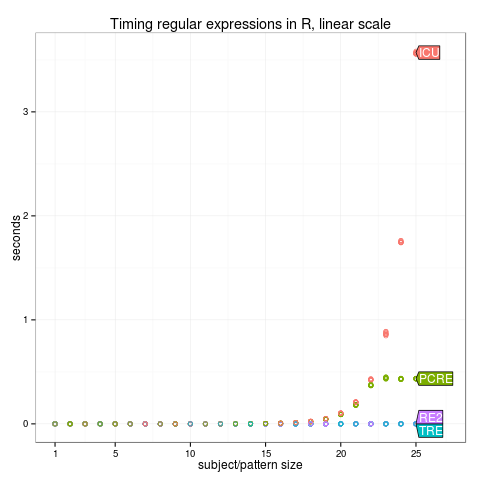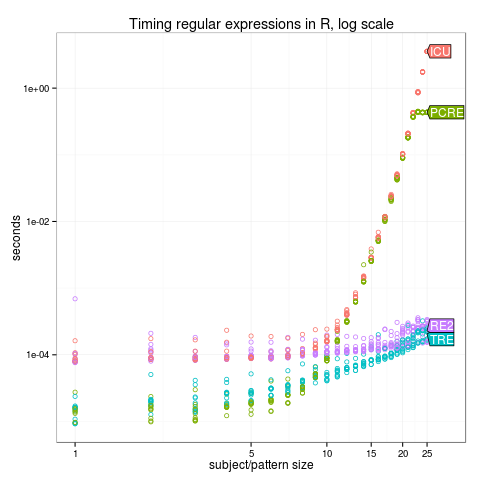-
Notifications
You must be signed in to change notification settings - Fork 18
re2 regular expressions
Regular expressions are powerful tools for parsing loosely structured text data. Russ Cox’s ”Regular Expression Matching Can Be Simple And Fast” explains that due to backreference support, several common regular expression engines have a time complexity which is exponential in pattern size (including PCRE which is used by R). One way to achieve polynomial time complexity is to drop backreference support and use the re2 C++ library.
- Base R functions such as
regexpruse PCRE when given theperl=TRUEargument. PCRE includes many useful features, such as named capture, but has an exponential time complexity. - Base R functions such as
regexpruse TRE when given theperl=FALSEargument. TRE has a polynomial time complexity but does not include named capture groups. -
stringr::str_matchandstringi::stri_matchuse the regex engine from the ICU library, which has an exponential time complexity. The stringi package does not support named capture yet as such a feature set is still considered as experimental in ICU.
The figures below show timings of these libraries for matching the pattern a?a?a?aaa against the subject aaa (N=3), for several different values of N. Source.


The GSOC student should write an R package interface to the re2 C++ code, providing the R community with the first regular expression package with both named capture and polynomial time complexity.
| R function | library | named capture | complexity | unicode |
|---|---|---|---|---|
regexpr(perl=FALSE) |
TRE | no | polynomial | ??? |
stringi::stri_match() |
ICU | no | exponential | yes |
regexpr(perl=TRUE) |
PCRE | yes | exponential | ??? |
str_match_re2() |
re2 | yes | polynomial | ??? |
- For a discussion of unicode support see http://www.rexamine.com/2013/04/properly-internationalized-regular-expressions-in-r/
- Use the namedCapture package as a model for the re2 package API:
| namedCapture function | re2 function | finds | returns |
|---|---|---|---|
str_match_named |
str_match_re2 |
first match | character matrix |
str_match_all_named |
str_match_all_re2 |
several matches | list of character matrices |
- Copy and modify the tests in the namedCapture package.
- Write an R interface that compiles the pattern and then uses the RE2::PartialMatch C++ function.
- Write a vignette with extensive benchmarks, covering also real-world text data samples and popular regexes like email, www search, etc.
Please get in touch with Toby Dylan Hocking <tdhock5@gmail.com> and Marek Gagolewski <gagolewski@rexamine.com> as soon as possible.
Do one or several — doing more hard tests makes you more likely to be selected.
- Easy: add the
stringr::str_matchfunction to the benchmark, and re-compute the timings. - Medium: make a package with a vignette that has the benchmark timings figures.
- Hard: demonstrate that you know how to interface C++ code with R by writing a package with a function that calls some custom C++ code (e.g., try to call
stri_enc_toutf8from the latest stringi-devel C API from within C++ code).
Students, please post a link to your test results here.